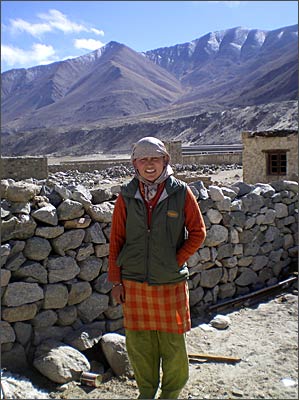|
|
| Help | |
| You are here: Rediff Home » India » Other India |
|
 As India celebrates the 60th year of her Independence, we ask the new drivers of India, her youth, to share their dreams for themselves, and for the nation:
As India celebrates the 60th year of her Independence, we ask the new drivers of India, her youth, to share their dreams for themselves, and for the nation:
Dechan Yangdol, 24
Durbuk, Ladakh
Shy, but pragmatic, Dechan Yangdol, 24, hails from the tiny village of Durbuk.
Situated at about 13,500 feet, Durbuk -- with a population Dechan puts at about 300-400 -- is located just 60 kilometres from India's border with Aksai Chin (the part of India occupied by China in Sino-Indian War of 1962) in one of the remotest and most inhospitable corners of the country.
To reach Dechan's village, which is a distant 130 kilometres east of Leh, Ladakh (part of the state of Jammu and Kashmir [Images]) one travels across nearly four long hours of desolate, rocky, moon-like landscape that ascends and descends through the snowy Chang La at 17,800 feet, the third highest pass in the world.
You pass bleak, chilly countryside, that is most of the time reminiscent of outer Mongolia. A few red lichen-like plants and some patches of grass exist along with groups of wild and very shy ibex, large herds of hairy yaks and sheep minded by nomadic tribes. The craggy, barren mountains form an unvarying backdrop. In winter, temperatures can drop below minus 40 degrees C around here and Durbuk is cut off from the rest of Ladakh because Chang La is closed.
The folks in Dechan's village, close to the Shayok river, make a living planting wheat and peas and selling wool from sheep and yaks for pashmina shawls (livestock outnumbers people around here). Monthly family incomes around here oscillate between Rs 7,000 and Rs 10,000 during the planting season you are told. Durbuk is connected with Leh by a daily bus in summer.
Dechan belongs to a Buddhist farmer family and has a sister. She has studied till Class 9 in her village government school. Though she is 24 years old, she has no immediate plans for her future. Nor any special dreams.
Marriage? "We decide to do that according to our own wishes," she tells you firmly. She hasn't any thoughts on the subject as yet. She does not plan to study further and, till marriage happens, she makes herself useful about the home and wishes to help with the farming.
She is fond of cooking and her relatives, who crowd around eagerly to help Dechan with this interview, says she makes superb momos and a mean thukpa (a hearty noodle-based soup popular in these parts). In winter, like the other womenfolk, she spends her time knitting, and toasting in the sun.
When she was 17, Dechan had a chance to travel to Jammu and New Delhi by plane and then bus. She enjoyed her visit but pauses to thoughtfully consider what she liked about Delhi. An impish rosy-cheeked little girl, who is Dechan's fellow villager, ventures a perky, premature answer on Dechan's behalf, "Taj Mahal?" and everyone erupts into gales of giggles.
Says Dechan finally, "I liked the buildings. The greenery!"
Does Dechan wish to move out of Durbuk and find a place for herself in the larger world? "No," her answer this time comes quickly. To Delhi to make a new life? "I don't have a place to stay, so how could I go there?"
She adds, "I like my own village. I was born here. It is a beautiful place. There is peace here. The air and surroundings are clean. We have very fresh air and there are no dirty smells. Leh is so dirty and there are bad smells in the lanes of Leh!"
Dechan and the villagers are they say very happy with their living conditions. They have enough water, electricity and schools and are satisfied with their local leaders.
What does Dechan consider herself? The question puzzles her. You probe further. Is she an Indian? A Hindustani? Or a Ladakhi? What is she?
"Ladakhi," is the swift answer. And after a pause, tentatively, "Yes, we are also Hindustani." And what does it mean to be Hindustani or Indian? No answer. She does not know and says no answer comes into her head. She has seen the Republic Day parade on television and liked it very much.
Dechan does not know too much about the rest of India. Her main view to the outside world is via Hindi television serials. The village favourite is Kum Kum and Kasautii Zindagi Kay; they are Dechan's favourites too. They are unable to watch any serials from 6.30 pm to 11 pm when there is electricity load shedding.
Everybody attempts to crowd into the photograph. Dechan examines the digital image in wonder. As you leave, she has one parting question:
"What does it mean to be Hindustani?"
 Photograph: Vaihayasi Pande Daniel
Photograph: Vaihayasi Pande Daniel
|
|
| © 2007 Rediff.com India Limited. All Rights Reserved. Disclaimer | Feedback |